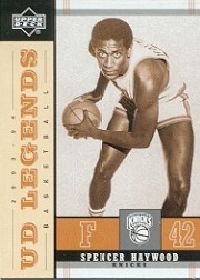Position: Forward
Spencer Haywood was an Olympic gold medalist at age 19, the American Basketball Association Most Valuable Player at 21, and the NBA's preeminent power forward at 23. Yet as good as he was in his prime, Haywood is best known as the first "hardship" case, the first player to turn professional less than four years after entering college. His jump led to a landmark court ruling, stating that to prohibit an underclassman from turning pro was a violation of free trade.
Advertisement
Haywood played both forward and center during his career. He perfected a baseline jump shot and had good range from the perimeter. A fluid athlete at 6'9", 225 pounds, he relied on quickness more than force, yet he still was one of the best rebounders of his generation. During his one season of collegiate competition, he led the nation with 22.1 rebounds a game. The next season, he led the ABA with 19.5 a game.
Born April 22, 1949, in Silver City, Mississippi, Haywood described his family as "a step below poor." In his early teens, he picked cotton for $3 a day. When he was 15, an uncle brought him to Detroit to showcase his basketball talents.
After playing one season at a junior college, Haywood was thrust into a starting role with the U.S. team at the 1968 Summer Olympics in Mexico City. He played the 1968-1969 season with the University of Detroit, averaging 32.1 points, then bolted for the ABA. He spent one season with the Denver Rockets, leading the ABA in scoring (30.0 points per game) before jumping to the NBA's Seattle SuperSonics in 1970-1971.
Haywood averaged 24.9 points and 12.1 rebounds in five seasons with Seattle and led the Sonics to the playoffs for the first time in their history. He was traded to the New York Knicks in 1975 and later played with the New Orleans Jazz, the Los Angeles Lakers, and -- after two years in Italy -- the Washington Bullets.
The Lakers released him in 1980 after Haywood admitted to a cocaine addiction, which he subsequently chronicled in his autobiography, Spencer Haywood: The Rise, the Fall, the Recovery.
Advertisement
